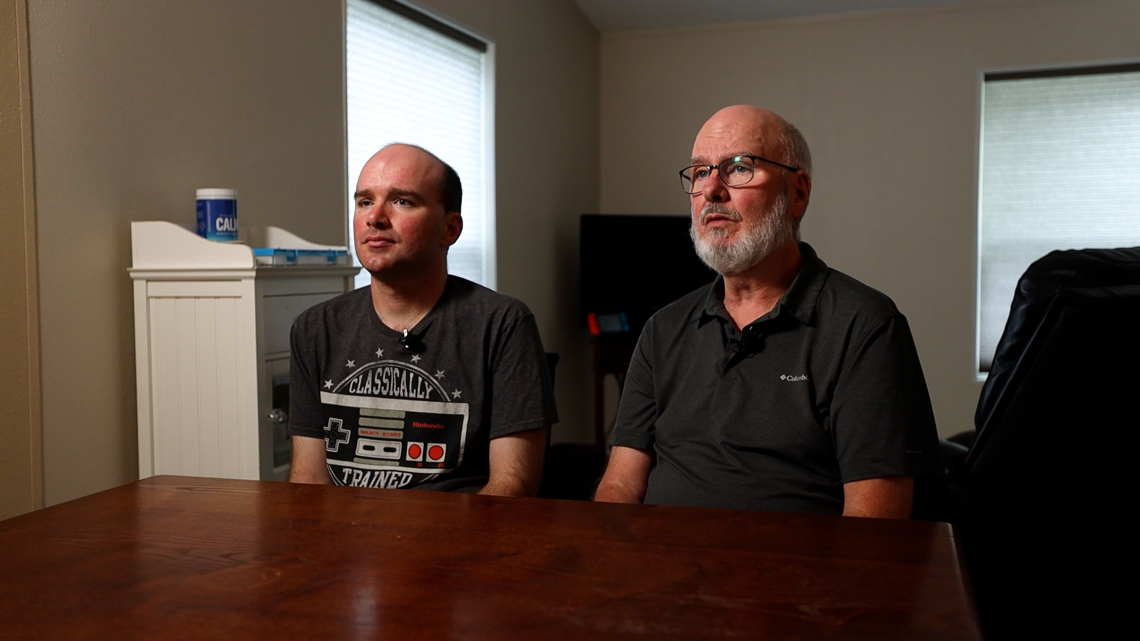State lawmakers say they’re aware of problems with the intersection of disabilities and mental health care. For Alex Tenison, he just wants the noises to stop.
MILWAUKIE, Ore. — People with intellectual or developmental disabilities say they face challenges accessing mental health services in Oregon — isolated into a separate category of treatment.
State lawmakers like Sen. Sara Gelser Blouin say they’re aware of the problem, and people with disabilities deserve access to the same mental healthcare options as anyone else.
Alex Tenison, a 35-year-old diagnosed with autism, just wants the noises to stop.
“That makes me scared,” Alex Tenison said, referencing incessant sounds he hears in monthly episodes that he and his father are trying to resolve.
Alex takes walks each day, loves his video games, and lives on his own a few blocks away from his dad, Larry Tenison, in Milwaukie.
Described by his father as a “calendar head,” Alex can correctly name the day of the week for any date going back hundreds of years.
Alex is at his best when asked questions with direct answers. During an interview with KGW, his father helped relay some of the questions.
Lately, about every month, something goes wrong and Alex flips a switch.
“What are you hearing in your head?” Larry asked his son.
“I’m hearing Percy’s whistle,” Alex said.
“Yeah, he hears train whistles from (a show) when he was a kid,” Larry said.
In these moments of crisis, Alex has tried anything to make the noises stop.
“How did you get that knot up there? You hit your head to try and make it stop?” Larry asked Alex.
A recent episode lasted overnight, so Larry took Alex to the emergency room, hoping for a mental health hold and psychiatric evaluation.
Larry said a doctor told them that because Alex has a developmental disability, he doesn’t make a good patient for mental health services.
“I said, ‘What difference does it make if somebody has (a developmental disability) if they’re having a mental crisis — they need treatment, it shouldn’t matter,'” Larry Tenison said.
As this wasn’t the only time Alex has had trouble accessing mental health care services, Larry looked into it and found that other people in Oregon have faced similar challenges. He said he learned that the medical system can silo one area from another, classifying symptoms as behavior.
Sen. Gelser Blouin told KGW that this is a serious problem that she’s seen firsthand.
“It’s not appropriate for a person having a psychotic break to walk into an emergency room and be told, ‘We don’t do people with intellectual and developmental disabilities,’ and that happens,” Gelser Blouin said. “It happened to a family member of mine, it’s happened to many, many people.”
Gelser Blouin said she previously took a family member to the emergency room for a mental health crisis evaluation, only to be turned away.
“I was told, as the person that’s worked on this (issue) for years and a legislator, that there are three systems: a medical system, a mental health system and a DD (developmental disability) system — and my family member belonged in the DD system,” Gelser Blouin said. “Individuals with intellectual and developmental disabilities need to access all three systems because they all provide different things, and the fact that we don’t do that in Oregon is nothing short of discrimination.”
It’s a problem that Oregon lawmakers recognize. In 2024, they passed Senate Bill 1557, prohibiting the denial of mental health services on the basis of disability status.
In July, the Oregon Health Authority sent a memo to hospitals and mental health organizations — making it clear that providers can’t deny access to mental health assessment or treatment because someone has an intellectual or developmental disability.
The memo said providers should “assess clinician competence and confidence” in this area, making sure they’re prepared for the intersection between mental health and disabilities.
“When providers say, or a CEO says, but we don’t have anybody that’s trained to do that — OK, what are you doing to get people that are trained to do that?” Gelser Blouin said.
However, SB 1557 only applies to people under the age of 21. A similar proposal for adults over 21 was folded into a bill to change civil commitment standards in Oregon, and that bill died in committee in early 2024.
“We absolutely have to address that,” Gelser Blouin said, alluding to new action in the upcoming legislative session.
Alex Tenison currently takes some “rescue medication” to fight the noises in his head.
“I take a chill pill,” Alex said.
But in moments of crisis, he doesn’t think to take them on his own.
After many years of behavioral treatments and tests, Larry Tenison said he’s convinced that the noises and outbursts are mental health-related, rather than autism-related, and he’d love medical providers to consider that perspective.
He’s now participating in a research study on dual diagnosis in Oregon, looking into how people access resources and support services within their communities.
“I think until we start pushing back, I’m not sure the thing’s going to change,” Larry said.
Alex, would love a change, too.
“You want to get rid of those things, right?” Larry asked him.
“No more Percy’s whistle, no more banging the head, right?”
“That’s what we’re looking for.”
link

